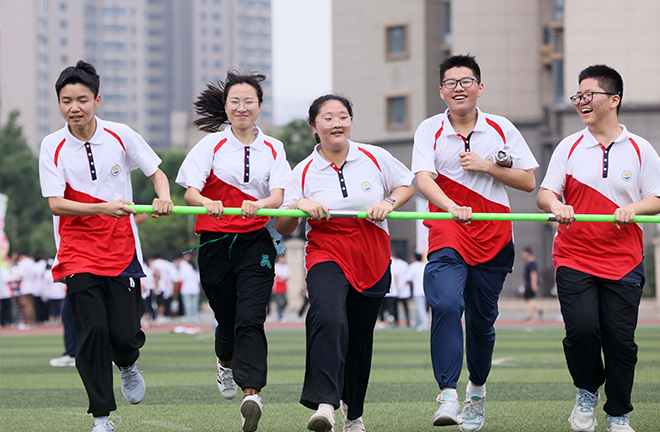Targeted support key to adolescent mental wellbeing

Students of the Hefei No. 38th Middle School in Anhui Province take part in an activity for promoting mental wellbeing. Photo: IC PHOTO
With the accelerating pace of life and growing competitive pressures, mental health issues among adolescents have become increasingly pronounced, with a noticeable trend toward younger age groups. In this context, addressing the root causes of these problems and implementing precise psychological interventions for adolescents is of significant practical importance. Enhancing the specificity and effectiveness of mental health initiatives is key to improving their overall wellbeing.
Necessity of targeted support
Delivering tailored mental health services for adolescents is a vital component of advancing Chinese modernization, as adolescents represent the future talent pool for this national endeavor and a crucial force in realizing the great rejuvenation of the Chinese nation.
Furthermore, targeted approaches to addressing adolescent mental health challenges are an essential element of the national “Healthy China” initiative. The Mental Health Action Plan for Children and Adolescents (2019–2022), part of the broader initiative, highlights the significance of mental health work for children and adolescents. Adolescents’ mental health issues exhibit characteristics of being typical, diverse, novel, complex, and increasingly prominent, with challenges such as learning disabilities, mood disorders, internet addiction, and interpersonal difficulties becoming more prevalent.
The Outline of Healthy China 2030 emphasizes the importance of raising mental health awareness through comprehensive public education campaigns and strengthening interventions for common mental disorders and behavioral issues, such as depression and anxiety. Reducing the incidence of mental health problems among adolescents and implementing targeted measures to support their well-rounded development are integral to the success of the “Healthy China” initiative.
Challenges
The Chinese government has attached high importance to mental and psychological health, particularly the healthy development of teenage minds, with various policies, plans, and guidelines implemented, clarifying the importance of mental health issues at the macro level and emphasizing the coordinated development of individual physical and psychological wellbeing.
Despite these efforts, the dissemination and implementation of mental health services and public awareness campaigns remain lagging. Many students and their parents still lack sufficient understanding of psychological health issues or how to seek help. Consequently, public awareness of mental health remains out of sync with the government’s proactive stance.
At present, the demand for mental health services is growing, particularly among adolescents experiencing psycho-behavioral problems, who require targeted guidance and treatment from qualified professionals. However, the training and cultivation of mental health professionals face significant challenges, including limited theoretical training, insufficient practical skill development, and a lack of mentorship systems. These issues result in a shortage of professionals, substandard levels of expertise, and pronounced regional disparities.
The imbalance between the slow growth of mental health resources and the rising demand for psychological support, as well as between the gradual improvement in professional qualifications and the urgent need for skilled counselors, are key obstacles to delivering targeted psychological aid for adolescents.
Additionally, teenagers’ psychological and behavioral problems are inherently complex, diverse in nature, symptoms, and causes. While there are over 500 clinically validated, standardized psychological therapies for various mental and behavioral issues, many treatment mechanisms require further investigation and validation. Existing evidence remains insufficient or inconsistent, and while most methods are effective to some extent, their specific advantages in clinical settings are unclear. This makes it challenging to identify the most effective approach, leaving complex mental health problems unresolved despite the availability of diverse treatment options.
The above problems necessitate a comprehensive, multifaceted approach to deliver effective and targeted psychological support for adolescents with mental health challenges. Key measures include fostering collaboration among parents, children, teachers, and broader societal institutions such as schools, communities, and hospitals; diversifying services while developing a highly skilled professional workforce dedicated to adolescent mental health; expanding public awareness campaigns to promote mental health literacy and reduce stigma; enhancing adolescents’ capacities for self-prevention; and customizing therapeutic interventions to meet the unique needs of different groups.
Wang Lijun is an associate professor from the School of Educational Science at Anhui Normal University.
Edited by CHEN MIRONG
